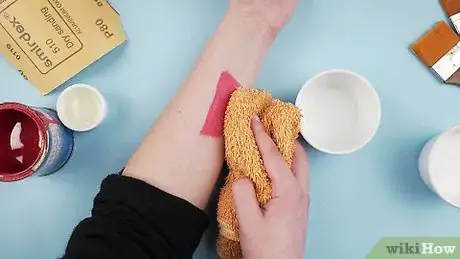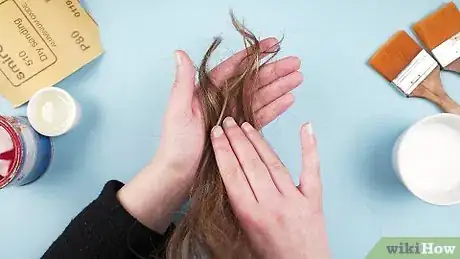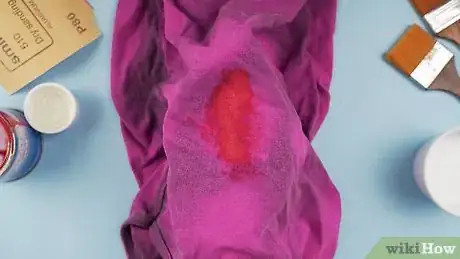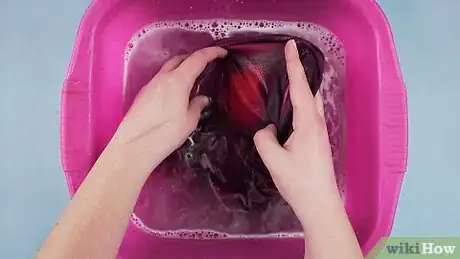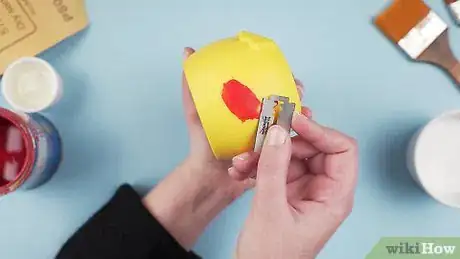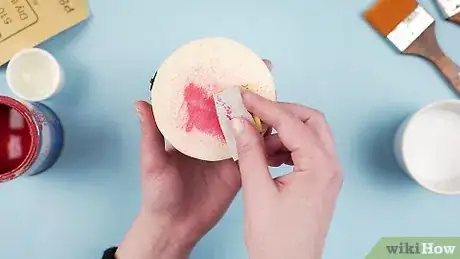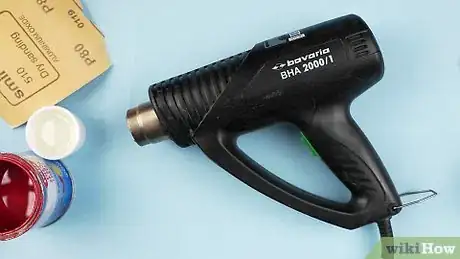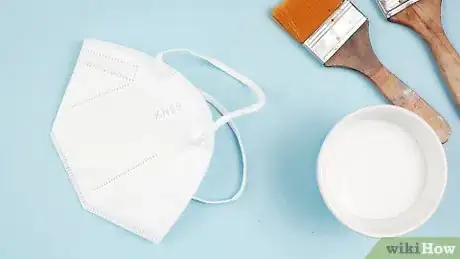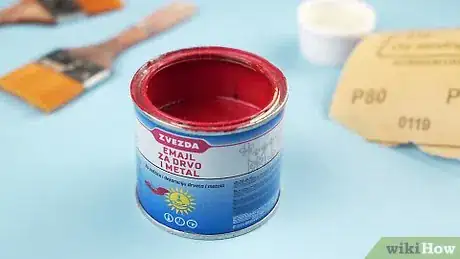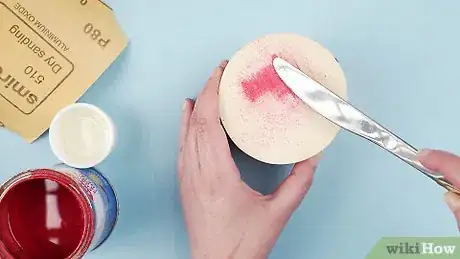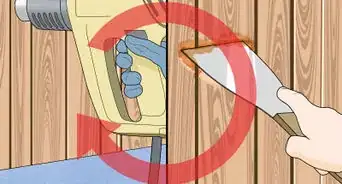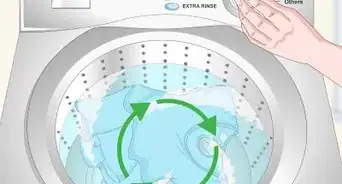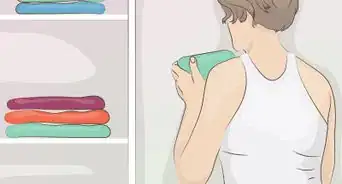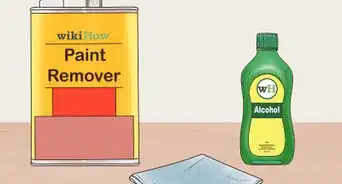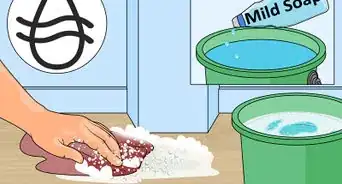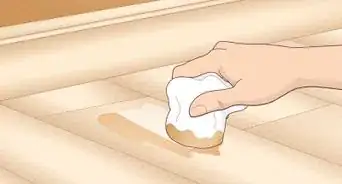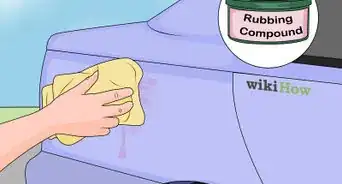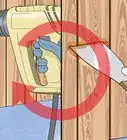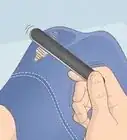This article was co-authored by Jeff Baldwin. Jeff Baldwin is a Residential Painter and the Owner of Baldwin Custom Painting. With two decades of painting experience, Jeff specializes in high-end residential and small commercial painting projects. Dedicated to quality craftsmanship, Jeff and Baldwin Custom Painting provide bonded/insured, licensed, and lead-safe certified services in residential painting, light commercial painting, and wood refinishing.
There are 9 references cited in this article, which can be found at the bottom of the page.
This article has been viewed 76,055 times.
Enamel paint is oil-based, so it is a bit more difficult to remove than water-based acrylics. If you've managed to get some enamel paint on your skin, fabric, or a hard object, then the key is to act fast. Try to blot or scrape away as much paint as you can before it fully dries. Depending on the stained surface, use a combination of oils, thinner, or even a heat gun to remove the rest of the paint. Be patient and your efforts will be rewarded with a newly cleaned surface.
Steps
Removing Paint from Your Skin and Hair
-
1Apply a cooking oil and baking soda mixture to your skin. Get a small bowl and mix together cooking oil and baking soda in a 50-50 ratio. Then, dip a washcloth into the mixture and rub it against your skin gently. Try to rub at a slight angle and continue until the paint begins to flake away or your skin gets irritated.[1]
- You can also use olive or coconut oil for this mixture instead.
- If the paint is dried on, using a toothbrush to apply the mixture and scrub might be more effective.
-
2Rub a cooking oil and dish soap mixture onto your skin. In a small bowl, mix together 50-50 dish soap and cooking oil. Then, pour this mixture on to the painted spot. Allow it to soak in for a minute before rubbing the area until it lathers. The soap will help to break down the paint's oils. Rinse off the area with water when you are done.[2]Advertisement
-
3Work cooking oil into your hair to remove paint. It's easy to get a few drops of enamel paint in your hair when working on a project. To get rid of this paint, place a few drops of cooking oil on to your fingertips. Massage this oil into each part of your hair that has paint on it. Wash your hair and watch the paint rinse away.[3]
- If you have a lot of paint in your hair, then you may need to apply more cooking oil and place part of your hair in plastic wrap before rinsing.
Removing Paint from Fabric
-
1Act quickly if you are working with fabric. When enamel paint dries on fabric, it bonds with the fibers and becomes much more difficult to remove.[4] If you can't get to work on removing the paint right away, then place a damp towel on the area. This will at least keep the paint wet until you can remove it.[5]
-
2Soak up any paint before working with fabric. Place the fabric on a hard surface. Gently swipe the edge of a butter knife or spoon against the fabric, going with the grain. This should pick up some of the stain. Then, blot at the paint with a clean rag to pick up any more excess. If the paint has dried, you can also use a knife's blunt edge to flake it away.[6]
- Be very careful when using a blunt edge to remove paint from a fabric or you may damage the threads. If you see any loosening threads, stop right away.
-
3Saturate the painted area of fabric with laundry detergent. Smooth the fabric out on a hard surface. Place a thin board directly underneath the paint stain, so it won't soak through. Use a toothbrush to apply a coating of detergent to the stain. Let the detergent soak for 5 minutes.[7] Then, scrub the stain gently with a toothbrush.[8]
- After the stain begins to lift, wash the fabric as the tag suggests. Or, you can soak it in water for 12 hours.
-
4Rinse the fabric by hand with soap and water. Mix a 50-50 solution of warm water and dish soap in a bowl. Soak up the mixture with a clean sponge and then sit this sponge on top of the stain. Lightly press the sponge against the stain until the paint begins to lift.[9]
Removing Paint from Hard Surfaces
-
1Use a razor blade to peel up paint on hard surfaces. Position the razor blade so that it is almost flat against the surface. Then, press down slowly and move the edge of the blade against the painted area. Continue sliding the blade back and forth until the paint begins to separate and peel.[10]
- Be very careful handling a razor blade or you might cut yourself. Never place your fingers or hand in front of the blade.
- Check after each stroke to ensure that you are not scratching the surface with the blade.
-
2Sand away the paint if you are working with wood. Get a medium-grade sandpaper and sand over the painted areas. Sand in small overlapping circles to get the most paint off.[11] Apply gentle, but consistent pressure. If you are worried about damaging the wood, use an even finer grade paper and check for marks as you go along.[12]
-
3Wipe vinegar onto painted glass. Create a 50-50 white vinegar and water mixture. Place this mixture in the microwave and heat it until it is just warm. Then, wet down the edge of a rag and rub it against the painted glass area. Continue rubbing in circles until you see the paint start to peel up.[13]
- Make sure to place the mixture into a microwave-safe container.
-
4Use thinner to remove paint from brushes. Empty and rinse out an old glass jar. Pour about 2 inches (5.1 cm) of paint thinner into the jar. Then, when you are finished painting, set your brush inside the jar and move it around. Watch as the paint begins to fall off the bristles. Remove the brush and wipe it off with a junk towel.[14]
- When you are done cleaning your brushes, you can put a lid on the jar and use it again after another project. Sealed paint thinner will last for months.
- Make sure to purchase and use a thinner designed for enamel or oil-based paints.
-
5Warm up the painted area with a heat gun. Purchase a heat gun at your local hardware or home improvement store. These guns work by sending hot air against a surface. Read the instructions that came with your gun and practice holding it before plugging it in. Then, plug it in and aim the hot air against the painted surface. Wait until the paint heats up and use a scraper to pull it away.[15]
- Be very careful when handling or using a heat gun, as you can burn yourself severely.
- Heat and peel the paint away in small sections, so that you don't need to heat the same section up multiple times.
- Make sure that the surface that you are heating up won't be damaged by the high temperature. For example, most plastic surfaces will melt when exposed to a heat gun.
Following General Good Practices for Paint Removal
-
1Take the proper safety precautions. When you remove enamel paint, it may release irritating dust into the air. Wear a safety mask or gloves to minimize irritation to your skin and lungs. If you suspect that the paint contains lead, then contact your local environmental agency for removal advice.[16]
-
2Read the paint label for instructions. Some enamel paints tell you right on the package how to best handle removal. Particular enamel paints are even designed to be more like acrylics and can be removed with water. Before you start on the removal process, check on the package or contact the manufacturer for tips.[17]
-
3Do a test spot. Whether you are removing enamel paint from wood, glass, or fabric, it never hurts to test your methods in an inconspicuous spot first.[18] If you plan to use a tool, such as a spoon, scrape it lightly against an unaffected area to see what happens. If you are going to apply a solution, put a few drops on the surface and watch for damage.[19]
Expert Q&A
-
QuestionHow can I remove water-based paint from a surface?
 Jeff BaldwinJeff Baldwin is a Residential Painter and the Owner of Baldwin Custom Painting. With two decades of painting experience, Jeff specializes in high-end residential and small commercial painting projects. Dedicated to quality craftsmanship, Jeff and Baldwin Custom Painting provide bonded/insured, licensed, and lead-safe certified services in residential painting, light commercial painting, and wood refinishing.
Jeff BaldwinJeff Baldwin is a Residential Painter and the Owner of Baldwin Custom Painting. With two decades of painting experience, Jeff specializes in high-end residential and small commercial painting projects. Dedicated to quality craftsmanship, Jeff and Baldwin Custom Painting provide bonded/insured, licensed, and lead-safe certified services in residential painting, light commercial painting, and wood refinishing.
Residential Painter You can spray a little latex paint remover on it. Allow it to sit on the dried paint for a few minutes to soften it. Then clean with warm water and a clean cloth.
You can spray a little latex paint remover on it. Allow it to sit on the dried paint for a few minutes to soften it. Then clean with warm water and a clean cloth. -
QuestionCan I use a latex paint remover on clothes?
 Jeff BaldwinJeff Baldwin is a Residential Painter and the Owner of Baldwin Custom Painting. With two decades of painting experience, Jeff specializes in high-end residential and small commercial painting projects. Dedicated to quality craftsmanship, Jeff and Baldwin Custom Painting provide bonded/insured, licensed, and lead-safe certified services in residential painting, light commercial painting, and wood refinishing.
Jeff BaldwinJeff Baldwin is a Residential Painter and the Owner of Baldwin Custom Painting. With two decades of painting experience, Jeff specializes in high-end residential and small commercial painting projects. Dedicated to quality craftsmanship, Jeff and Baldwin Custom Painting provide bonded/insured, licensed, and lead-safe certified services in residential painting, light commercial painting, and wood refinishing.
Residential Painter It is difficult to remove paint from clothes once it is dry. You can use latex paint remover and a firm bristle nail brush to remove it.
It is difficult to remove paint from clothes once it is dry. You can use latex paint remover and a firm bristle nail brush to remove it. -
QuestionHow do you remove paint from concrete?
 Jeff BaldwinJeff Baldwin is a Residential Painter and the Owner of Baldwin Custom Painting. With two decades of painting experience, Jeff specializes in high-end residential and small commercial painting projects. Dedicated to quality craftsmanship, Jeff and Baldwin Custom Painting provide bonded/insured, licensed, and lead-safe certified services in residential painting, light commercial painting, and wood refinishing.
Jeff BaldwinJeff Baldwin is a Residential Painter and the Owner of Baldwin Custom Painting. With two decades of painting experience, Jeff specializes in high-end residential and small commercial painting projects. Dedicated to quality craftsmanship, Jeff and Baldwin Custom Painting provide bonded/insured, licensed, and lead-safe certified services in residential painting, light commercial painting, and wood refinishing.
Residential Painter It is best to use a pressure washer to remove paint from concrete. Do not use a wire brush to clean stained, stamped concrete. It can damage the finish.
It is best to use a pressure washer to remove paint from concrete. Do not use a wire brush to clean stained, stamped concrete. It can damage the finish.
Warnings
- If you try one liquid stain removal method, rinse it off as much as possible before attempting another. Mixing chemicals can damage the painted surface.[20]⧼thumbs_response⧽
References
- ↑ https://www.mom4real.com/how-to-remove-spray-paint-from-your-skin-no-chemicals/
- ↑ https://refreshliving.us/the-natural-way-to-remove-oil-based/
- ↑ https://www.hairfinder.com/hair4/paint-in-hair.htm
- ↑ Jeff Baldwin. Residential Painter. Expert Interview. 1 March 2021.
- ↑ https://www.cleanipedia.com/gb/laundry/get-paint-clothes
- ↑ https://www.cleanipedia.com/gb/laundry/get-paint-clothes
- ↑ https://www.cleanipedia.com/gb/laundry/get-paint-clothes
- ↑ Jeff Baldwin. Residential Painter. Expert Interview. 1 March 2021.
- ↑ http://www.goodhousekeeping.com/home/cleaning/tips/a17273/stains-paint-latex-may07/
- ↑ http://www.apartmenttherapy.com/a-nontoxic-scra-109180
- ↑ Jeff Baldwin. Residential Painter. Expert Interview. 1 March 2021.
- ↑ https://www.theshabbycreekcottage.com/how-to-remove-paint-from-furniture.html
- ↑ http://www.apartmenttherapy.com/a-nontoxic-scra-109180
- ↑ https://refreshliving.us/the-natural-way-to-remove-oil-based/
- ↑ https://www.theshabbycreekcottage.com/how-to-remove-paint-from-furniture.html
- ↑ https://www.theshabbycreekcottage.com/how-to-remove-paint-from-furniture.html
- ↑ https://www.cleanipedia.com/gb/laundry/get-paint-clothes
- ↑ Jeff Baldwin. Residential Painter. Expert Interview. 1 March 2021.
- ↑ http://www.kidspot.com.au/lifestyle/home/home-solutions/how-to-remove-paint-stains/news-story/397e0f05a1f2fcfb070a80c0e5d7f446
- ↑ http://www.kidspot.com.au/lifestyle/home/home-solutions/how-to-remove-paint-stains/news-story/397e0f05a1f2fcfb070a80c0e5d7f446
About This Article
If you’ve gotten enamel paint on your skin, fabric, or a hard surface, you can remove it with some household cleaners. To get enamel paint off of your skin, mix equal parts cooking oil and baking soda and gently rub it onto your skin. If you don’t have any baking soda, mix dish soap with the cooking oil instead. Then, rinse the cleaner off with water. To get paint out of fabric, first scrape any wet paint off with a butter knife. Then, dab the fabric with a sponge and warm soapy water and rinse it off. If you’ve gotten paint on a hard surface, use a razor blade to scrape it off. You can also use sandpaper to get paint out of wooden surfaces. For more cleaning tips, including how to get enamel paint out of your hair, read on!
